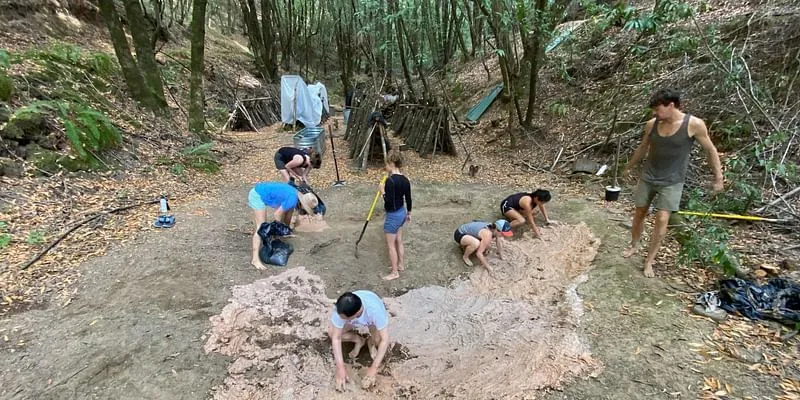[Sustainable Agenda] The online platform aiming to shape 100M climate-conscious professionals by 2030
Founded by Anshuman Bapna, Dr Kamal Kapadia, and Mayank Jain, Terra.do aims to turn climate-focused intentions into real-world impactful actions.
About two years ago, IIT Bombay graduate Anshuman Bapna started getting concerned about the state of climate affairs and transitioned his career towards climate change. Despite being capable, he found it difficult to apply his skills to make it practical.
Around the same time, he met Dr Kamal Kapadia — a climate expert and educator with 25 years of experience in work, research and teaching in clean energy, climate resilience, and sustainable development fields.
Kamal, who was staying in Hawaii, was also looking to reconnect with India and do something more on a global scale.
The duo, along with their friend Mayank Jain, came up with a platform to educate and help people like Anshuman. Thus, they started Terra.do in 2020 with a single flagship course — “Climate Change: Learning for Action” — prepared by Kamal from her academic background.

Screenshot of the graduation of the cohort of the Flagship program: “Climate Change: Learning for Action”
was started with 20 students, and slowly, it grew over the years.
Backed by leading Indian CEOs and investors, the startup aims to solve climate change using the trifecta of education, networking, and action.
In August 2020, Terra.do raised $1.5 million in early-stage funding from a group of climate-conscious angel investors — including Zomato Founder and CEO Deepinder Goyal; Zerodha Founder and CEO, Nithin Kamath; MakeMyTrip Founder and CEO Deep Kalra; Former Flipkart Chief People Officer Mekin Maheshwari; Yulu Founder Amit Gupta, and Helion Venture Partners Co-founder Ashish Gupta.
Terra.do courses
Terra.do’s presence in India is part of a global response to climate change. The company aims to turn climate-focused intentions into real-world impactful actions.
Designed from day one to be 100 percent remote, Terra.do is made up of employees, instructors, fellows, and alumni from over 25 countries.
At present, the climate education and career transition platform have about 10 courses, typically taught in six to twelve weeks for designers, software engineers, oil and gas professionals, venture capitalists, electric vehicles and fleets, farm schools, and more.

From from Climate Farm School- which is the only hybrid course
According to Kamal, most of these contents are prepared in partnerships with experts, academicians, and practitioners from each field, and reviewed by Terra along with intensive training on the subject supported by instructors.
“We combine learning, professional networks, and jobs in one place to enable and empower people to work on climate,” says Kamal.
In December 2021, Terra.do conducted two climate job fairs — one for Renewable Energy, and the other for Recruiters and HR Professionals. Over 30 companies participated in the fair, and almost all of them offered remote or global offers. Kamal says they are hoping for more such fairs to be organised in the future.
Speaking on the dynamic possibility of a course like ‘Becoming a Climate Designer,’ she says, “It is a course where everyone in the design and creative fraternity can come in. That would mean someone either into UX, fashion/textile, artists, graphic designers, illustrators, product designers, and more.”
“The course radically teaches design as world-making and how it could sustain the world. For example, someone who is into electric vehicles could be a part of the course on EV, but if they are an automobile designer or engineer, they could very much be a part of a course like Becoming a Climate Designer,” she adds.
For a sustainable future
According to Kamal, people need to know about three important things when they are undergoing this transition of becoming climate-conscious through Terra.
First comes knowledge and understanding about the climate context and being exposed to all kinds of solutions to get inspired.
Second comes building a like-minded community based on topics of interest or skills, where they can continue to engage and share resources and learnings.
Terra.do has a Slack channel with over 1200 people, including professionals, academics, activists and investors, who have successfully invested in climate ventures.
Finally, it's the support and guidance. ”It is sometimes anxiety-provoking to change your career or think about the climate. Our experts give all kinds of support during this phase, including career counselling,” Kamal says.
At present, the platform has more than 400 mentors (all of whom are climate experts in their fields) who teach students across all courses. “Of the 400, we have more than 50 mentors from India,” she adds.
The cost for courses ranges between $699 and $2990. However, all courses have merit and need-based financial aid available. Terra.do also assists learners with an EMI option. All courses are online, except the course on Farm School, which is hybrid (online and on-farm).
So far, about 1,200 people have graduated, with over 60 percent of them already working on climate change.
“We now aim to enable 100 million climate-conscious professionals by 2030. That's how many people we need to fundamentally impact climate change,” Kamal concludes.
Edited by Suman Singh

![[Sustainable Agenda] The online platform aiming to shape 100M climate-conscious professionals by 2030](https://images.yourstory.com/cs/5/79900dd0d91311e8a16045a90309d734/Terra-1641999053107.jpg?mode=crop&crop=faces&ar=2%3A1&format=auto&w=1920&q=75)
![[Sustainability Agenda] How these teenagers are changing the way we talk about climate crisis](https://images.yourstory.com/cs/5/79900dd0d91311e8a16045a90309d734/CopyofImageTagsEditorialTeamMaster-1637160234010.jpg?fm=png&auto=format&h=100&w=100&crop=entropy&fit=crop)





